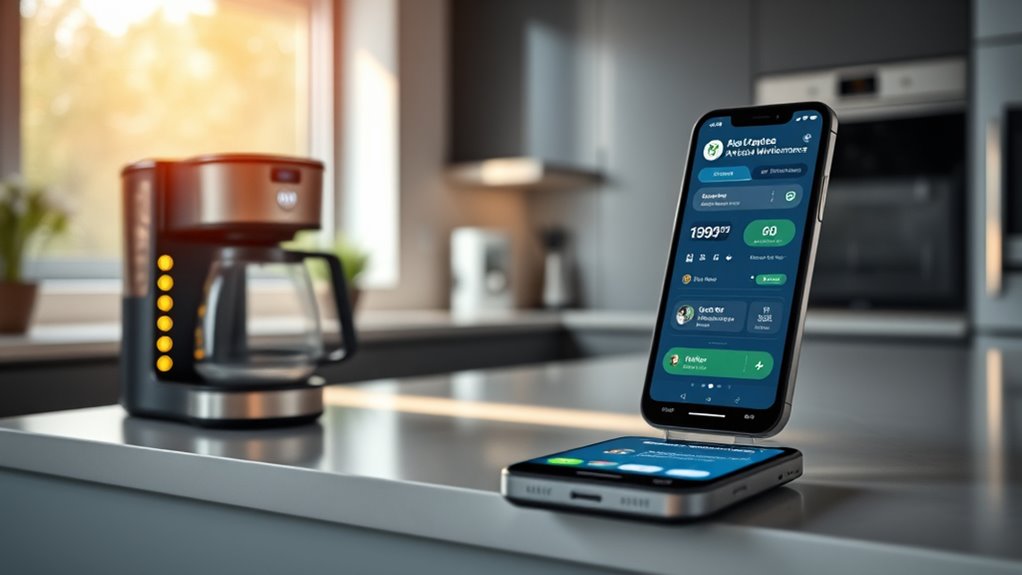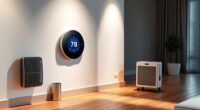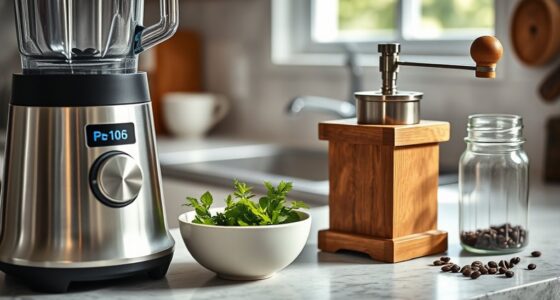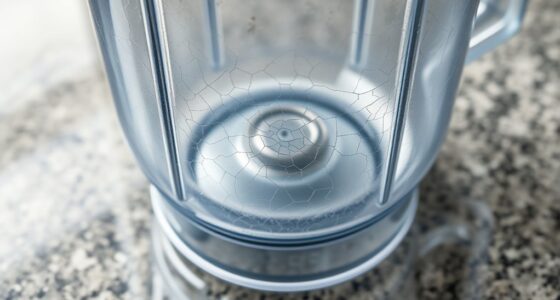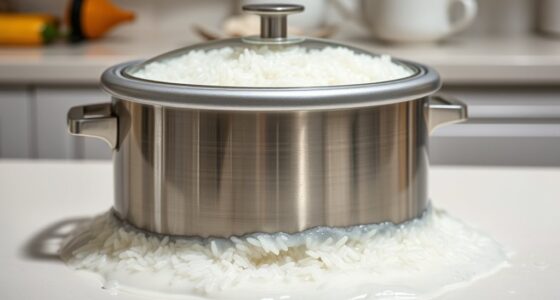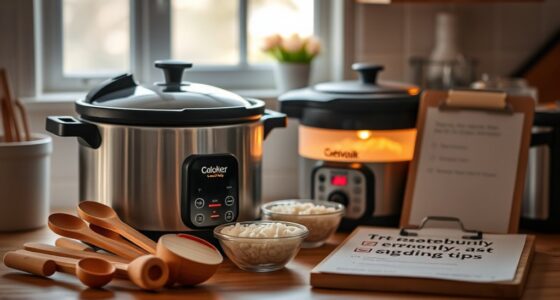IoT innovations are revolutionizing how you maintain small appliances through predictive maintenance. Smart sensors monitor key parameters like temperature, vibrations, and performance in real time, alerting you to potential issues before they become costly repairs. By analyzing usage patterns and sensor data, appliances can suggest timely service or repairs, reducing downtime and extending lifespan. If you want to discover how these advancements can keep your appliances running smoothly, continue exploring these exciting technologies.
Key Takeaways
- IoT-enabled sensors monitor appliance performance in real-time, enabling early detection of issues.
- Smart maintenance scheduling uses sensor data and usage patterns to optimize service timing.
- Alerts and notifications are sent directly to users’ smartphones for immediate troubleshooting.
- IoT innovations extend appliance lifespan by preventing breakdowns through proactive care.
- User-friendly apps facilitate seamless integration, customization, and monitoring without technical expertise.
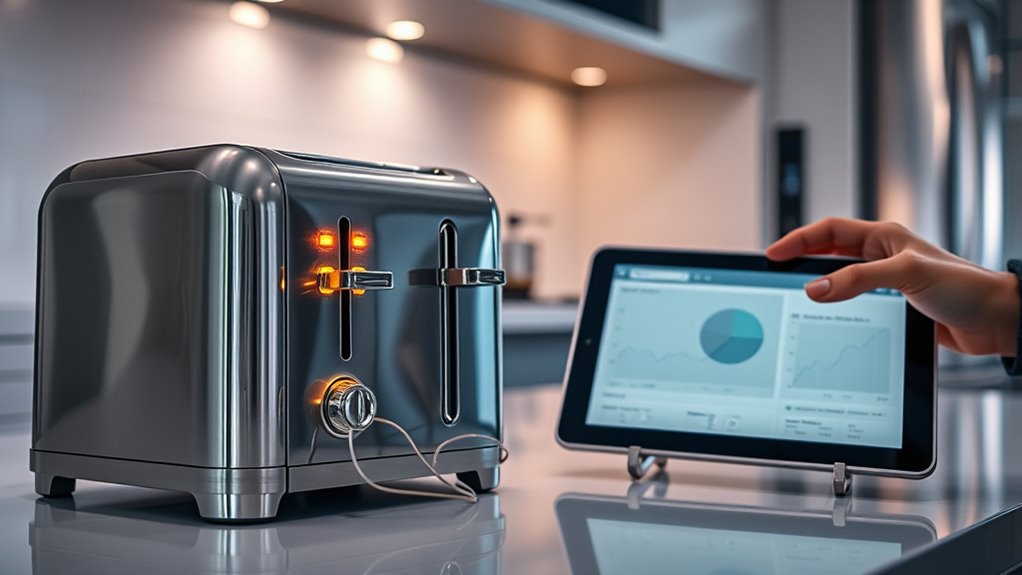
Have you ever wondered how to keep your small appliances running smoothly and avoid unexpected breakdowns? The secret lies in leveraging IoT innovations like smart sensor integration and maintenance scheduling. These technologies transform how you care for your devices, giving you proactive control instead of reactive fixes. Smart sensor integration involves embedding tiny sensors into your appliances that continuously monitor their performance, temperature, vibrations, and other critical parameters. With these sensors, you get real-time data about your appliances’ health, allowing you to spot issues before they become serious problems. For instance, if a sensor detects irregular vibrations or overheating, it can send an alert directly to your phone, prompting you to take action immediately. This proactive approach prevents costly repairs and extends the lifespan of your devices.
Smart sensors monitor appliance health in real-time, alerting you to issues before they become costly repairs.
Maintenance scheduling becomes smarter with these IoT capabilities. Instead of relying on generic timelines or waiting for symptoms to appear, you can set up automatic maintenance reminders based on actual usage and sensor data. For example, if your coffee maker’s sensors indicate that a certain component is wearing out faster than expected, your system can automatically suggest or schedule a maintenance session. This personalized scheduling ensures that your appliances are serviced precisely when needed, reducing downtime and optimizing performance. It also means you’re no longer stuck guessing or remembering when to clean filters, replace parts, or perform routine checks. Instead, your appliances tell you exactly what they need and when.
Implementing smart sensor integration and maintenance scheduling doesn’t require extensive technical knowledge. Many IoT-enabled appliances come with user-friendly apps that connect seamlessly to your devices. These apps compile data from sensors, analyze it, and provide clear notifications or suggestions. You can even set custom alerts for specific issues, giving you peace of mind that your appliances are always in good shape. Additionally, these systems often learn from your usage patterns, becoming more accurate over time. This smart feedback loop helps you stay ahead of potential problems without constant manual monitoring.
Additionally, emerging trends in dog names and personalization make it easier to tailor maintenance routines to your specific appliances and usage habits. Ultimately, integrating smart sensors and automated maintenance scheduling into your routine means fewer surprises and more reliable appliances. You’ll save time, money, and frustration by addressing issues early, before they escalate. Plus, you’ll extend the life of your small appliances, ensuring they serve you well for years to come. As IoT technology continues to evolve, it’s clear that smart sensor integration and maintenance scheduling will become essential tools for anyone looking to maintain their appliances efficiently and effortlessly.
Frequently Asked Questions
How Secure Are Iot Devices in Small Appliances?
IoT devices in small appliances can be quite secure if you guarantee they have proper device encryption and receive regular firmware updates. Encryption protects your data from unauthorized access, while firmware updates patch security vulnerabilities. You should always keep your devices updated and choose brands that prioritize security. Avoid default passwords and enable security settings to minimize risks, making your smart appliances safer to use.
What Is the Cost of Implementing Predictive Maintenance?
You’re looking at an upfront investment that varies based on the complexity of the system, but it’s not a cost to sneeze at. The cost analysis includes investment costs like sensors, connectivity, and software, plus ongoing maintenance. While initial expenses might seem steep, they often save money long-term by preventing breakdowns. Think of it as planting seeds now for a harvest later—efficiency pays off over time.
How Accurate Are Iot-Based Predictions for Appliance Failures?
IoT-based failure prediction can be highly accurate if sensor accuracy is maintained, often reaching 85-95% reliability. Your success depends on high-quality sensors and proper data analysis, which detect subtle signs of potential failures. Keep in mind, though, that environmental factors or sensor malfunctions can affect accuracy. Staying vigilant with sensor calibration and data validation helps guarantee your appliance failure prediction remains dependable and effective.
Can Existing Appliances Be Upgraded With Iot Sensors?
Yes, you can upgrade existing appliances with IoT sensors through appliance retrofitting. This process involves sensor integration, where small devices are added to monitor appliance performance and predict failures. By retrofitting, you enhance your appliances’ capabilities without replacing them entirely. It’s a cost-effective way to enable smarter maintenance, improve efficiency, and extend the lifespan of your appliances. Just guarantee compatibility and proper installation for peak results.
What Are the Privacy Concerns With Connected Small Appliances?
Think of your connected appliances as silent spies gathering your habits. You might not see the data privacy risks or user tracking behind those smart features, but they’re there. Your information could be vulnerable to breaches or misuse, compromising your privacy. Always stay vigilant, review privacy settings, and understand how your data’s being stored and shared. Protect your digital home as fiercely as your physical one.
Conclusion
By embracing IoT innovations for predictive maintenance, you turn small appliances from simple tools into intelligent partners. While these devices may seem insignificant, their ability to anticipate issues and save costs reveals a hidden power—reminding you that even the smallest innovations can lead to big improvements. Don’t overlook the potential; sometimes, the smallest change in your routine can make all the difference in your home’s efficiency and longevity.
